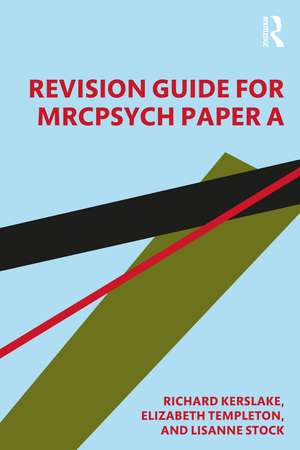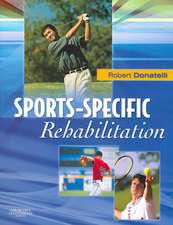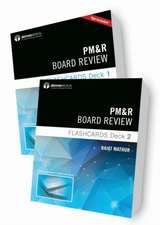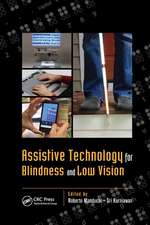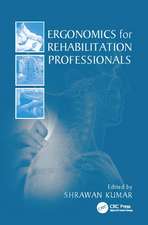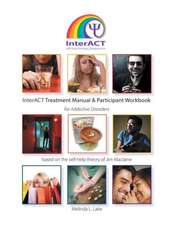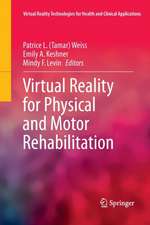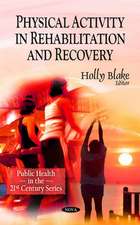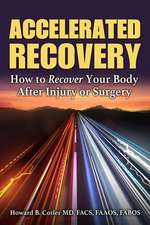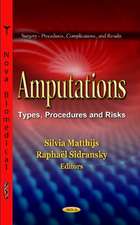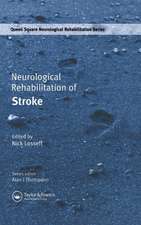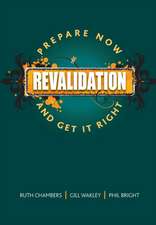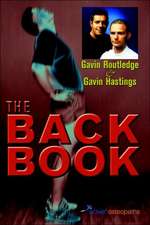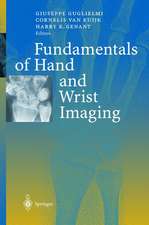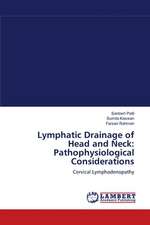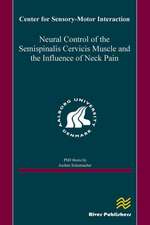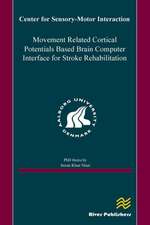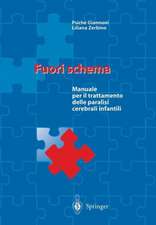Revision Guide for MRCPsych Paper A
Autor Elizabeth Templeton, Richard William Kerslake, Lisanne Stocken Limba Engleză Paperback – 30 sep 2022
| Toate formatele și edițiile | Preț | Express |
|---|---|---|
| Paperback (1) | 203.81 lei 22-36 zile | +12.42 lei 6-12 zile |
| Taylor & Francis – 30 sep 2022 | 203.81 lei 22-36 zile | +12.42 lei 6-12 zile |
| Hardback (1) | 1096.68 lei 43-57 zile | |
| Taylor & Francis – 30 sep 2022 | 1096.68 lei 43-57 zile |
Preț: 203.81 lei
Preț vechi: 214.54 lei
-5% Nou
Puncte Express: 306
Preț estimativ în valută:
39.01€ • 42.39$ • 32.79£
39.01€ • 42.39$ • 32.79£
Carte disponibilă
Livrare economică 31 martie-14 aprilie
Livrare express 15-21 martie pentru 22.41 lei
Preluare comenzi: 021 569.72.76
Specificații
ISBN-13: 9781498716130
ISBN-10: 149871613X
Pagini: 250
Ilustrații: 72
Dimensiuni: 152 x 229 x 16 mm
Greutate: 0.34 kg
Ediția:1
Editura: Taylor & Francis
Colecția Routledge
Locul publicării:Oxford, United Kingdom
ISBN-10: 149871613X
Pagini: 250
Ilustrații: 72
Dimensiuni: 152 x 229 x 16 mm
Greutate: 0.34 kg
Ediția:1
Editura: Taylor & Francis
Colecția Routledge
Locul publicării:Oxford, United Kingdom
Recenzii
"This is an excellent resource for MRCPsych students. It provides wide coverage of the curriculum while delivering the key details that make the difference in examinations." - Joanna Moncrieff, Reader in Critical and Social Psychiatry, Division of Psychiatry, UCL, UCL MRCPsych course organiser
"I have found the revision guide so helpful when preparing for the MRCPsych Part A exam. It is presented in an informative and concise manner and has been a great resource to use, especially when revising on the go. It was a great help towards passing the exam, I would highly recommend!" - Dr Fraser MacNicoll, Core Trainee in Psychiatry
"I have found the revision guide so helpful when preparing for the MRCPsych Part A exam. It is presented in an informative and concise manner and has been a great resource to use, especially when revising on the go. It was a great help towards passing the exam, I would highly recommend!" - Dr Fraser MacNicoll, Core Trainee in Psychiatry
Cuprins
PART I: Behavioural Sciences and Sociocultural Psychiatry; 1 Fundamentals of Psychology; a) Conditioning; b) Shaping and Chaining; c) Social Learning Theory; d) Perceptual Organisation; e) Theories of Perception; f) Memory; g) Retrieval; h) Ribot’s Law; i) Memory Disorders; j) Memory Neuroscience; k) Brain Structures Involved in Memory; 2 Basic and Social Psychology; a) Personality; b) Emotion; c) Motivation; d) Attitudes; e) Intelligence; f) Cognitive Dissonance (Leon Festinger); g) Self-Psychology; h) Attribution; i) Theory of Mind; j) Controversial Studies; k) Groups and Conforming; l) Consent in Minors; 3 Sociocultural Psychiatry; a) Ethics; b) Global Ethical Policies; c) Human Rights; d) Models of Illness; e) Family Life; f) Theory of Expressed Emotion (EE); g) Society and Mental Health; h) History of Major Publications in Psychiatry; i) Important Figures in Psychiatry; j) Immigration and Schizophrenia; k) Stigma; l) Grief; PART II: Human Development; 4 Theories of Human Development; a) Piaget’s Theory of Cognitive Development; b) The Zone of Proximal Development; c) Kohlberg’s Theory of Moral Development; d) Freud’s Stages of Psychosexual Development (1905); e) Erikson’s Stages of Psychosocial Development; f) Mahler’s ‘Separation-Individuation’ Stages of Child Development (1968); g) Table of Relevant Developmental Stages; h) Temperament; i) Fear; j) Speech/Language Milestones; k) Motor Milestones; l) Attachment Theory; m) Studies Related to Attachment; n) Mary Ainsworth (1973); o) Developmental Concepts; p) Parenting Styles; q) Freudian Concepts; r) Assessment of Intelligence; PART III: Basic Neurosciences; 5 Neuroanatomy; a) Brain Development; b) Cranial Fossae; c) Meningeal Layers; d) Cortical Structures; f) Cranial Foramina; g) Subcortical Structures; h) Thalamus; i) Cerebellum; j) Brain Stem and Cranial Nerves; k) White Matter Pathways; l) Spinal Cord; m) Cerebrospinal Fluid (CSF); n) Blood Supply; o) Blood-Brain Barrier (BBB); 6 Neurophysiology; a) The Action Potential; b) The Hypothalamic-Pituitary-Adrenal Axis (HPA); c) Adrenal Fatigue; d) Thyroid Gland; e) Adrenal Cortex; f) Dexamethasone Suppression Tests (DSTs); g) Tremors; h) Electroencephalograms (EEG); i) Sleep Architecture; j) Sleep Disorders; 7 Neurochemistry; a) Classification of Receptors; b) Biogenic Amines; c) Catecholamines; d) Monoamine Oxidase (MAO); e) Acetylcholine; 8 Molecular Genetics; a) DNA; b) RNA; c) Copying DNA; d) DNA Mutations; e) Translocations; f) Terminology; g) Mendelian Inheritance ; h) Non-Mendelian Inheritance; i) Techniques in Molecular Genetics; j) Heritability; k) Concordance; l) Hardy–Weinberg Equilibrium; m) Genetic Studies; n) Schizophrenia Genetics; o) Affective Disorders Genetics; p) Autism Genetics; q) Attention-Deficit/Hyperactivity Disorder (ADHD) Genetics; r) Summary of Genetic Disorders; 9 Clinical Neuropathology; a) Alzheimer’s Disease (AD); b) Lewy Body Dementia (LBD); c) Frontotemporal Dementia (FTD); d) Creutzfeldt-Jakob Disease (CJD); e) Schizophrenia; f) Parkinson’s Disease; g) Summary of Pathological Findings; 10 Applied Neurosciences; a) Frontal Lobe; b) Parietal Lobe; c) Temporal Lobe Lesions; d) Apraxia; e) Language; f) Agnosia; PART IV: Clinical Psychopharmacology; 11 Mechanisms of Psychotropic Drugs; a) Classification of Psychotropic Medications; b) Typical Antipsychotics; d) Antidepressants; e) Anxiolytics and Sedatives; f) Antiepileptics and Mood Stabilisers; g) Dementia Drugs; h) ADHD Drugs; i) Drugs Used in the Treatment of Substance Misuse; j) Recreational Drugs; 12 Specifics of Prescribing; a) Rational Prescribing; b) Drugs With Psychiatric Side Effects; c) Side Effects of Antidepressants; d) Antidepressant Withdrawal; e) Side Effects of Antipsychotics; f) Metabolic Side Effects of Antipsychotics; g) Antipsychotic Associated Hyperprolactinaemia; h) Drug Doses; i) Neuroleptic Malignant Syndrome and Serotonin Syndrome; j) Allergies and Toxicity; k) Specialist Drug Monitoring; l) Prescribing in Special Groups; m) Prescribing in Pregnancy and Breastfeeding; n) Principles in Psychiatric Emergencies; o) Driving; p) Electroconvulsive Therapy (ECT); q) Factors Affecting Medication Adherence; r) The Placebo Effect; 13 Pharmacokinetics; a) Key Aspects; b) Absorption; c) Distribution; d) Metabolism; e) Excretion; 14 Broader Aspects of Psychopharmacology; a) Clinical Trials; b) Adverse Event Reporting; PART V: Classification and Assessment; 15 Classification; a) Diagnostic Manuals; b) Changes From DSM-IV to DSM-5; c) Approaches to Classification; 16 History and Mental State Examination; a) The Psychiatric History; b) Cognitive Function; c) The Neurological Examination; d) Blood Investigations; e) Specialist Dementia Scans; f) Delirium; g) Eating Disorders; h) Treatment With Comorbid HIV Infection; i) Intelligence Quotient (IQ); j) Assessment Scales; 17 Psychopathology; a) Thought Disorders; b) Classifying Thought Form; c) Explanatory Models; d) Classifying Thought Content; e) Disorders of Speech; f) Disorders of Memory; g) Disorders of Mood and Affect; h) Disorders of Perception; 18 Diagnosis and ICD-10 Classification Codes; a) ICD-10 vs. DSM-IV 198; b) F00—F09 Organic, Including Symptomatic, Mental Disorders; c) F10—F19 Mental and Behavioural Disorders Due to Psychoactive Substance Use; d) F20—F29 Schizophrenia, Schizotypal and Delusional Disorder; e) F30—F39 Mood (Affective) Disorders; f) F40—F49 Neurotic, Stress-Related and Somatoform Disorders; g) F50—F59 Behavioural Syndromes Associated With Physiological Disturbances and Physical Factors; h) F60—F69 Disorders of Adult Personality and Behaviour
Notă biografică
Richard Kerslake, MBBS, MRCPsych, is a higher trainee in general adult and older persons psychiatry. He is a graduate of the Royal Free and University College London medical school. Dr. Kerslake is currently based in Sussex, England, having previously worked at Orygen Youth Health, Melbourne, and then completed core training in London. He is currently an honorary clinical lecturer at Brighton & Sussex Medical School where he has a special interest in simulation-based education and training of physician associates.
Elizabeth Templeton, MBChB, MRCPsych, trained at the University of Liverpool and graduated with honours in 2006. She moved to London soon after to start her psychiatric core training within the Camden and Islington Foundation Trust. Dr. Templeton has always had a keen interest in medical education; she has contributed to OSCEsmart, a published revision guide for practical exams, and she has played a significant role in the development of a pan-London simulation-based training programme. Dr. Templeton is now a specialist registrar in East London.
Lisanne Stock, BMBCh, MRCPsych, graduated from the University of Oxford and completed her foundation and core training in North Central London, where she continues to work as a higher trainee in general adult psychiatry. Dr. Stock has an interest in medical education and co-runs the CASC In Hand tailored revision course for the final part of the MRCPsych examinations. Dr. Stock is also a trustee for the charity Nip in the Bud, which aims to improve recognition of mental health conditions in primary school children via film.
Elizabeth Templeton, MBChB, MRCPsych, trained at the University of Liverpool and graduated with honours in 2006. She moved to London soon after to start her psychiatric core training within the Camden and Islington Foundation Trust. Dr. Templeton has always had a keen interest in medical education; she has contributed to OSCEsmart, a published revision guide for practical exams, and she has played a significant role in the development of a pan-London simulation-based training programme. Dr. Templeton is now a specialist registrar in East London.
Lisanne Stock, BMBCh, MRCPsych, graduated from the University of Oxford and completed her foundation and core training in North Central London, where she continues to work as a higher trainee in general adult psychiatry. Dr. Stock has an interest in medical education and co-runs the CASC In Hand tailored revision course for the final part of the MRCPsych examinations. Dr. Stock is also a trustee for the charity Nip in the Bud, which aims to improve recognition of mental health conditions in primary school children via film.
Descriere
This study guide covers the key information necessary to pass Paper A of the postgraduate examination to become a member of the Royal College of Psychiatrists (MRCPsych).
